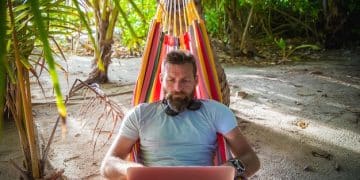Legal Guide for US Digital Nomads: Contracts, Taxes, and Insurance

Anúncios
Legal Considerations for US Digital Nomads: Contracts, Taxes, and Insurance are paramount for a sustainable location-independent lifestyle, encompassing contract negotiations, understanding tax obligations, and securing appropriate insurance coverage to mitigate risks.
Embarking on a digital nomad journey from the US combines freedom with responsibility. Crucial to this lifestyle are the Legal Considerations for US Digital Nomads: Contracts, Taxes, and Insurance. This article will guide you through these, ensuring your adventure remains legally sound and financially secure.
Anúncios
Understanding Contracts as a US Digital Nomad
As a digital nomad, your contracts are your lifeline. It’s essential to understand these agreements to protect your interests and ensure fair compensation for your work. Being aware of the nuances can prevent misunderstandings and legal disputes down the line.
Key Elements of a Solid Contract
A comprehensive contract should outline the scope of work, payment terms, deadlines, and intellectual property rights. Clear definitions in these areas can prevent ambiguity and protect both parties.
Anúncios
For US digital nomads, understanding which state’s laws govern the contract is also vital, as this can affect dispute resolution.
- Scope of Work: Clearly define the deliverables and expectations.
- Payment Terms: Specify payment amounts, schedules, and methods.
- Intellectual Property: Clarify ownership of the work produced.
In conclusion, mastering contract law is paramount for US digital nomads to safeguard their interests and ensure equitable compensation. Thoroughly reviewing and understanding each contract is essential for a secure and legally sound professional journey.
Navigating US Taxes While Living Abroad
One of the more complex aspects of the digital nomad lifestyle for US citizens is managing taxes. The US taxes its citizens on worldwide income, regardless of where they reside. Staying compliant with US tax laws while living abroad requires understanding specific rules and regulations.

Understanding the Foreign Earned Income Exclusion (FEIE)
The FEIE allows US citizens living abroad to exclude a certain amount of their foreign-earned income from US taxes. To qualify, you must meet either the physical presence test or the bona fide residence test.
Careful planning and documentation are crucial to take full advantage of the FEIE. Consider consulting with a tax professional experienced in international taxation.
- Physical Presence Test: Requires being physically present in a foreign country for 330 full days during a 12-month period.
- Bona Fide Residence Test: Requires establishing residency in a foreign country.
- Form 2555: This is the form you’ll need to file to claim the FEIE.
In conclusion, navigating US taxes as a digital nomad requires careful planning and a clear understanding of the FEIE and other relevant tax rules. Staying informed and seeking professional advice can help ensure compliance and minimize your tax burden.
Health and Travel Insurance for US Digital Nomads
Securing adequate health and travel insurance is a critical consideration for US digital nomads. Standard domestic health insurance policies often provide limited or no coverage outside the United States. Therefore, it’s essential to find insurance options that cater specifically to international travelers.
Types of Insurance to Consider
Travel insurance can cover trip cancellations, lost luggage, and emergency medical expenses. Health insurance designed for expats can provide more comprehensive coverage, including routine check-ups and specialist care.
When choosing a policy, be sure to check the coverage limits, exclusions, and the process for filing a claim. Understanding these details can save you from unexpected costs and complications.
- Travel Insurance: Covers trip interruptions, lost belongings, and emergency medical care.
- Expat Health Insurance: Provides comprehensive health coverage for those living abroad.
- Evacuation Coverage: Essential for remote locations with limited medical facilities.
In conclusion, adequate health and travel insurance are non-negotiable for US digital nomads. Prioritizing comprehensive coverage ensures access to necessary medical care and financial protection against unforeseen events, contributing to a safer and more secure nomadic lifestyle.
Contracts with International Clients: Key Considerations
When working with clients from different countries, it is essential to consider the legal and cultural differences that may impact your contracts. This section outlines the key considerations for drawing up contracts that work across borders.
Governing Law and Jurisdiction
Clearly specify which country’s laws will govern the contract and where any disputes will be resolved. This can significantly impact the outcome of any legal proceedings.
Different countries have varying legal systems, so it’s essential to adapt your contracts accordingly. Language barriers can also complicate matters, so consider having contracts translated by a professional.
Key elements to consider are:
- Choice of Law: Which country’s laws apply?
- Dispute Resolution: Where will disputes be resolved (arbitration, mediation, or court)?
- Enforceability: How easily can the contract be enforced in the client’s country?
In conclusion, crafting contracts for international clients requires careful consideration of governing law, dispute resolution mechanisms, and cultural differences. Clear, unambiguous contracts that address potential cross-border challenges are essential for protecting the interests of US digital nomads.
Setting Up a Legal Business Structure as a Digital Nomad
While not always required, establishing a legal business structure can provide several benefits for US digital nomads. This section explores the different options available and the factors to consider.

LLC vs. Sole Proprietorship vs. S-Corp
The choice of business structure depends on your individual circumstances and goals. LLCs offer limited liability protection, while sole proprietorships are simpler to set up but provide no such protection.
S-Corps can offer tax advantages but involve more complex compliance requirements. Consult with a legal and tax professional to determine the best structure for your needs.
- Limited Liability Company (LLC): Offers liability protection and flexibility.
- Sole Proprietorship: Simple to set up, but no liability protection.
- S-Corporation: Potential tax benefits, but more complex compliance.
In conclusion, setting up a legal business structure can offer significant benefits for US digital nomads, including liability protection and potential tax advantages. Carefully evaluating the pros and cons of each structure and seeking professional advice is crucial for making an informed decision that aligns with your long-term business goals.
Protecting Your Intellectual Property as a US Digital Nomad
As a digital nomad, your intellectual property is one of your most valuable assets. Protecting it from infringement is crucial, especially when working across borders. This section provides practical tips for safeguarding your creative work.
Copyright and Trademark Considerations
Copyright protects original works of authorship, while trademarks protect brand names and logos. Registering your copyrights and trademarks can provide additional legal protection and make it easier to enforce your rights.
When creating content for clients, ensure that your contract clearly defines ownership of the intellectual property. This can avoid disputes and ensure that you retain control over your work.
Key steps to protect your IP:
- Copyright Registration: Register original works with the US Copyright Office.
- Trademark Registration: Protect your brand name and logo with the USPTO.
- Contracts: Clearly define IP ownership in all client agreements.
In conclusion, protecting your intellectual property is essential for US digital nomads. Registering copyrights and trademarks, defining IP ownership in contracts, and actively monitoring for infringement can help safeguard your creative work and ensure its long-term value.
| Key Area | Brief Description |
|---|---|
| 📝 Contracts | Clearly defined scope, payment terms, and IP rights are vital. |
| 💰 Taxes | Understand FEIE and US tax obligations while abroad. |
| 🛡️ Insurance | Secure travel and expat health insurance for global coverage. |
| 🏢 Business Structure | Consider LLC or S-Corp for legal and tax benefits. |
FAQ
▼
The FEIE allows eligible US citizens or residents living abroad to exclude a certain amount of their foreign-earned income from US federal income tax, reducing their tax liability.
▼
You typically need travel insurance for short trips covering medical emergencies and trip interruptions, and expat health insurance for more comprehensive healthcare coverage abroad.
▼
The “governing law” clause in your contract specifies which country’s laws will be used to interpret the contract and resolve any disputes that may arise.
▼
An LLC is often recommended for its liability protection and flexibility, but the best choice depends on individual circumstances and should be discussed with a professional.
▼
Register copyrights and trademarks in relevant countries, include clear IP ownership clauses in contracts, and monitor for any unauthorized use of your work online.
Conclusion
Navigating the Legal Considerations for US Digital Nomads: Contracts, Taxes, and Insurance is crucial for a secure and fulfilling location-independent lifestyle. By understanding contracts, managing taxes, securing appropriate insurance, and protecting your intellectual property, you can focus on your work and adventures with peace of mind.





